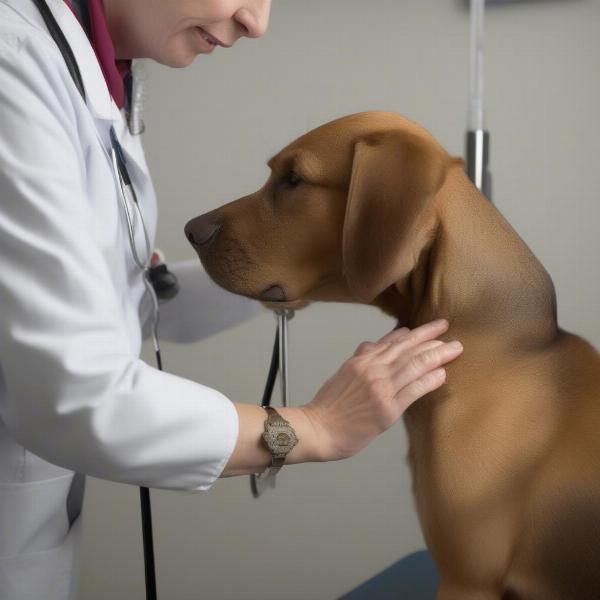A spinal tumor in a dog can be a frightening diagnosis. Understanding the types of tumors, symptoms, diagnosis, and treatment options can empower you to make informed decisions about your dog’s care. This comprehensive guide addresses key concerns about canine spinal tumors, offering insights into navigating this challenging situation.
Understanding Spinal Tumors in Dogs
Tumors affecting the spine can be primary, originating in the spinal cord or surrounding bone, or secondary, meaning they have spread from another location in the body (metastasis). These tumors can be benign or malignant, with malignant tumors posing a more serious threat due to their aggressive growth and potential to spread.
Recognizing the Signs: Symptoms of a Spinal Tumor
Symptoms vary depending on the tumor’s location, size, and growth rate. Common signs include:
- Pain and discomfort in the back or neck
- Weakness or paralysis in the limbs
- Difficulty walking or coordinating movements
- Loss of bladder or bowel control
- Changes in posture or gait
- Muscle atrophy
- Reduced appetite and weight loss
Diagnosing a Spinal Tumor: What to Expect
If you notice any of these symptoms, it’s crucial to consult a veterinarian immediately. Diagnosis typically involves a combination of:
- Physical examination and neurological assessment
- Imaging techniques such as X-rays, CT scans, and MRI
- Biopsy to determine the type of tumor
 Veterinarian examining a dog's spine
Veterinarian examining a dog's spine
Treatment Options for Spinal Tumors in Dogs
Treatment options depend on the type and location of the tumor, as well as the dog’s overall health. Options may include:
- Surgery to remove the tumor
- Radiation therapy to shrink the tumor
- Chemotherapy to target cancer cells
- Palliative care to manage pain and improve quality of life
Living with a Dog with a Spinal Tumor
Caring for a dog with a spinal tumor can be demanding. Providing a supportive and comfortable environment is essential. This may involve:
- Modifying the home to accommodate mobility challenges, such as ramps or harnesses.
- Providing a soft, comfortable bedding
- Assisting with urination and defecation if needed
- Administering medications as prescribed
- Regular physical therapy to maintain muscle function
Frequently Asked Questions
-
How common are spinal tumors in dogs? While not as common as other types of cancer, spinal tumors do occur in dogs, particularly in older breeds.
-
Can spinal tumors be cured? The prognosis depends on the type of tumor and the extent of its growth. Some benign tumors can be cured with surgery, while malignant tumors may require more aggressive treatment.
-
What is the life expectancy of a dog with a spinal tumor? Life expectancy varies significantly based on the individual case and treatment response. Some dogs can live for several years after diagnosis, while others may have a shorter prognosis.
-
How can I make my dog comfortable during treatment? Pain management is crucial. Your veterinarian can recommend medications and other strategies to ensure your dog’s comfort.
-
What are the signs my dog’s spinal tumor is progressing? Worsening pain, increased weakness or paralysis, and changes in behavior are potential signs of tumor progression.
-
Are there any alternative therapies for spinal tumors in dogs? Discuss any alternative therapies with your veterinarian to ensure they are safe and appropriate for your dog’s specific situation.
-
How can I prevent spinal tumors in my dog? Unfortunately, there are no known preventative measures for spinal tumors in dogs.
Conclusion
Dealing with a spinal tumor in your dog is undoubtedly challenging. Early detection, accurate diagnosis, and appropriate treatment are vital. By staying informed and working closely with your veterinarian, you can provide the best possible care for your beloved companion and help them maintain a good quality of life. Remember to monitor your dog closely for any changes in their condition and seek veterinary advice promptly if you have any concerns.
ILM Dog: Your Partner in Pet Care
ILM Dog provides expert advice and resources for all aspects of dog care, from breed selection and health to training and nutrition. We are committed to helping dog owners worldwide provide the best possible care for their furry friends. Whether you are a new dog owner or a seasoned expert, ILM Dog offers valuable insights and practical tips to support you on your journey. For professional guidance on dog health, behavior, or any other pet-related query, contact us at [email protected] or call us at +44 20-3965-8624. Visit ILM Dog for more information.